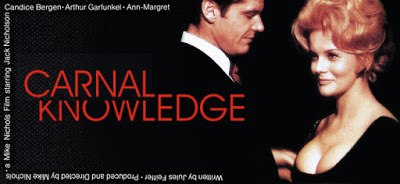Mike Nichols Graduates to “Carnal Knowledge”
 Having won acclaim and an Oscar for directing The Graduate in 1967, Mike Nichols soon moved on to bigger projects. The first, an ambitious adaptation of Joseph Heller’s darkly comic anti-war novel, Catch-22, got mixed reviews. For the second, Nichols returned to the funding source (Joseph E. Levine’s Embassy Pictures) and the subject matter (love and sex) that had worked so well for The Graduate. Carnal Knowledge, released in 1971, represents a fascinating follow-up to the affairs of a young man named Benjamin Braddock, who looks to sex to solve all his problems.
Having won acclaim and an Oscar for directing The Graduate in 1967, Mike Nichols soon moved on to bigger projects. The first, an ambitious adaptation of Joseph Heller’s darkly comic anti-war novel, Catch-22, got mixed reviews. For the second, Nichols returned to the funding source (Joseph E. Levine’s Embassy Pictures) and the subject matter (love and sex) that had worked so well for The Graduate. Carnal Knowledge, released in 1971, represents a fascinating follow-up to the affairs of a young man named Benjamin Braddock, who looks to sex to solve all his problems.Carnal Knowledge, scripted by the ultra-hip Jules Feiffer, starts with not one young man but two. At the film’s beginning, as they yak about girls in their dorm room, they’re a long way from graduation. Jonathan (Jack Nicholson) and Sandy (a surprisingly effective Art Garfunkel) are callow Amherst freshmen, and their discussion of sex is purely theoretical. But college life, post World War II, brings its rewards. Sandy is soon head over heels about the smart, savvy Susan (Candice Bergen), a Smith freshman with dreams of law school. Touched by his sweet naiveté, she permits him some . . er . . . liberties. But it’s Sandy’s bolder roommate, Jonathan, who gets her in the sack.
We jump ahead to about 1960. Sandy is now a busy doctor, with Susan as his homemaker wife. He describes their life together as idyllic, but he’s secretly looking to get laid by someone new and exciting. Jonathan, a financier, has been playing the field, but the voluptuous Bobbie (a sizzling Ann-Margret) seems exactly what he craves. As he puts it, “Believe me, looks are everything.”
You should be careful what you wish for. In short order, Sandy’s in thrall to his domineering new squeeze, and Jonathan has lost all passion for Bobbie, who wants marriage and family at any cost. The film jumps forward once more: it’s about 1970 and the men are forty years old. Sandy, now shacking up with a flower child, seems as fundamentally clueless as ever. Jonathan has been reduced to cataloging all the “ball-busters” he’s dated over the years, while forking over $100 bills in return for sexual pleasure at the hands of a pro.
It’s not a pretty picture, in more ways than one. Nichols, who brilliantly captured the look and feel of Southern California in The Graduate, goes a different route here. The Graduate was all sunshine and swimming pools: the visuals made a strong contribution to a story about affluent suburbanites (like Ben’s parents) who give things instead of love. Carnal Knowledge is an east coast story, without that same dramatic sense of place as a catalyst for the characters’ behavior. An Ivy League campus is merely some leafy woods and a dorm room; the characters’ later lives in New York City boil down to some lighted skyscrapers, a cushy office, and a nondescript apartment.
If visuals are not tremendously important, Nichols banks here on sound, both the period pop tunes on the soundtrack (like “I’m Getting Sentimental Over You” at the first dorm mixer) and the voices of the two men in earnest conversation. In fact, the opening credits roll over a black screen, while we listen to them gab about the sexcapades in their future. Later scenes are basically monologues, in which one or the other takes the pulse of his current sex life.
One sad thing: the female characters, once wed or bedded, completely disappear from the narrative. It’s a man’s world, and women like Susan and Bobbie—apparently without jobs or purpose—have no long-lasting place in it.
Published on July 31, 2015 09:03
No comments have been added yet.
Beverly in Movieland
I write twice weekly, covering topics relating to movies, moviemaking, and growing up Hollywood-adjacent. I believe that movies can change lives, and I'm always happy to hear from readers who'd like t
I write twice weekly, covering topics relating to movies, moviemaking, and growing up Hollywood-adjacent. I believe that movies can change lives, and I'm always happy to hear from readers who'd like to discuss that point.
...more
- Beverly Gray's profile
- 10 followers



